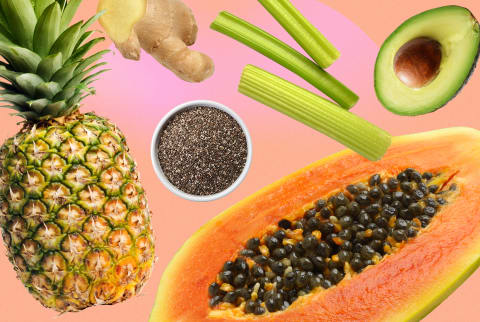This uncomfortable pause in your pooping schedule can be caused by gastrointestinal disorders, like irritable bowel syndrome, dehydration, or a lack of physical movement. And while there are a number of remedies to help relieve constipation, incorporating whole foods into your diet can be a safe and natural way to help you poop when you start feeling backed up. Below, integrative gastroenterologist Marvin Singh, M.D., and research specialist in oncology nutrition L.J. Amaral M.S., R.D., CSO, share which foods can support digestion and keep you regular: Consider making this pineapple tepache tonic, which is rich in natural probiotics to support a healthy gut. The enzyme, called papain, was proved in a 2013 study to help manage digestive disorders1 like IBS, constipation, and bloating. Along with staying hydrated, adding fruits and veggies with a lot of water can be helpful for digestion. Avocado is rich in insoluble fiber, Amaral says, and contains 13.5 grams of total dietary fiber3. “Packed with live bacteria, it helps to colonize the gut and promote regularity,” Amaral says. “Good bacteria aids in the fermentation of carbohydrates and other foods to promote health, especially gut health.” Flax contains a healthy amount of omega-3 fatty acids, which have been shown to reduce inflammation and improve blood pressure. Among the many health benefits of flax, it is a great source of fiber and has also been shown to reduce constipation4. Incorporating them can also increase the nutritional value of whatever you’re eating. Just 2 tablespoons of chia seeds contains more than 9 grams of fiber5, which helps promote digestion. In Ayurveda, ginger is commonly used to help stimulate the “digestive fire,” which helps the body break down food for optimal absorption. Singh says that both waking up and eating stimulate the GI tract, so drinking a cup of coffee first thing in the morning might help you poop. Fermented foods introduce healthy probiotic bacteria to the gut, and one study shows kimchi, specifically, promotes anti-constipation6 and colorectal health promotion. Functional medicine doctor Elizabeth Boham, M.D., M.S., R.D., always travels with organic prunes to prevent constipation. “They’re very high in fiber,” she tells mindbodygreen. “Many people need only three to four prunes to have regular bowel movements.” Black beans, for example, contain about 10 grams of fiber per cup7, and fava beans contain more than 9 grams. Three cups of air-popped popcorn contains about 3.6 grams of fiber. Not only does it speed up your digestion, though; corn also provides “B vitamins, zinc, copper, potassium, magnesium, phosphorus, iron, zinc, manganese, and polyphenol antioxidants,” Basch says. If you’re experiencing constipation often, we recommend talking with your doctor immediately to determine the best plan for you.





